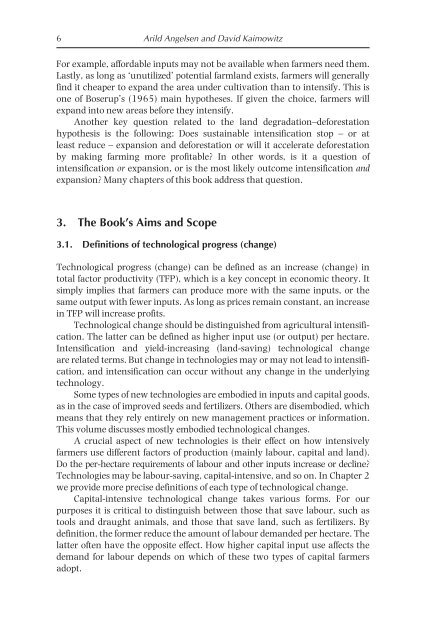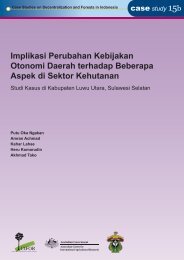- Page 2 and 3: Agricultural Technologies and Tropi
- Page 4 and 5: Contributors Contributors Arild Ang
- Page 6 and 7: Contributors xi Peter Roebeling (pe
- Page 8 and 9: Preface Preface As researchers and
- Page 10 and 11: Contents Contents Contributors ix P
- Page 12: 14 A Century of Technological Chang
- Page 15 and 16: 2 Arild Angelsen and David Kaimowit
- Page 17: 4 Arild Angelsen and David Kaimowit
- Page 21 and 22: 8 Arild Angelsen and David Kaimowit
- Page 23 and 24: 10 Arild Angelsen and David Kaimowi
- Page 25 and 26: 12 Arild Angelsen and David Kaimowi
- Page 27 and 28: 14 Arild Angelsen and David Kaimowi
- Page 29 and 30: 16 Arild Angelsen and David Kaimowi
- Page 32 and 33: Technological Arild 2 AngelsenChang
- Page 34 and 35: Technological Change and Deforestat
- Page 36 and 37: 3. Farm-level Effects Farmers respo
- Page 38 and 39: LD is the demand for labour on the
- Page 40 and 41: Technological Change and Deforestat
- Page 42 and 43: 4. Macroanalysis: General Equilibri
- Page 44 and 45: Technological Change and Deforestat
- Page 46 and 47: the relation between technological
- Page 48 and 49: Transition Alexander 3 from Mather
- Page 50 and 51: Transition from Deforestation to Re
- Page 52 and 53: Transition from Deforestation to Re
- Page 54 and 55: Transition from Deforestation to Re
- Page 56 and 57: Transition from Deforestation to Re
- Page 58 and 59: Transition from Deforestation to Re
- Page 60 and 61: Transition from Deforestation to Re
- Page 62 and 63: Transition from Deforestation to Re
- Page 64 and 65: Transition from Deforestation to Re
- Page 66 and 67: Did Thomas 4 a Green K. Rudel Revol
- Page 68 and 69:
Did a Green Revolution Restore the
- Page 70 and 71:
Did a Green Revolution Restore the
- Page 72 and 73:
Did a Green Revolution Restore the
- Page 74 and 75:
Did a Green Revolution Restore the
- Page 76 and 77:
Did a Green Revolution Restore the
- Page 78 and 79:
Did a Green Revolution Restore the
- Page 80 and 81:
4 Later, farmers learned to use mac
- Page 82 and 83:
Equilibrium Andrea 5 Cattaneo Analy
- Page 84 and 85:
Equilibrium Analysis of Technology,
- Page 86 and 87:
Equilibrium Analysis of Technology,
- Page 88 and 89:
Equilibrium Analysis of Technology,
- Page 90 and 91:
Equilibrium Analysis of Technology,
- Page 92 and 93:
Equilibrium Analysis of Technology,
- Page 94 and 95:
Equilibrium Analysis of Technology,
- Page 96 and 97:
Equilibrium Analysis of Technology,
- Page 98 and 99:
Equilibrium Analysis of Technology,
- Page 100 and 101:
Equilibrium Analysis of Technology,
- Page 102 and 103:
intensive in any specific factor, r
- Page 104 and 105:
Pasture Douglas 6 Management White
- Page 106 and 107:
large amounts of primary forest ult
- Page 108 and 109:
Pasture Management in Latin America
- Page 110 and 111:
Pasture Management in Latin America
- Page 112 and 113:
promising new forage germplasm. The
- Page 114 and 115:
6. Empirical Results Does improved
- Page 116 and 117:
Pasture Management in Latin America
- Page 118 and 119:
Secondly, we reported the above res
- Page 120 and 121:
management, if they had an incentiv
- Page 122 and 123:
Pasture Management in Latin America
- Page 124:
Pasture Management in Latin America
- Page 127 and 128:
114 Stephen A. Vosti et al. more fo
- Page 129 and 130:
116 Stephen A. Vosti et al. The pro
- Page 131 and 132:
118 Stephen A. Vosti et al. practic
- Page 133 and 134:
120 Stephen A. Vosti et al. fencing
- Page 135 and 136:
122 Stephen A. Vosti et al. Table 7
- Page 137 and 138:
124 Stephen A. Vosti et al. Table 7
- Page 139 and 140:
126 Stephen A. Vosti et al. competi
- Page 141 and 142:
128 Stephen A. Vosti et al. Herd gr
- Page 143 and 144:
130 Stephen A. Vosti et al. promoti
- Page 145 and 146:
132 Stephen A. Vosti et al. EMATER-
- Page 148 and 149:
Technological Peter 8 RoebelingProg
- Page 150 and 151:
Technological Progress versus Econo
- Page 152 and 153:
preferences determine productive ch
- Page 154 and 155:
eventually decide to sell their lan
- Page 156 and 157:
Technological Progress versus Econo
- Page 158 and 159:
159 Table 8.3. Technological progre
- Page 160 and 161:
Technological Progress versus Econo
- Page 162 and 163:
In conclusion, technological progre
- Page 164 and 165:
References Technological Progress v
- Page 166 and 167:
Land Francisco 9 Use, Pichon Agricu
- Page 168 and 169:
Land Use, Agricultural Technology a
- Page 170 and 171:
Land Use, Agricultural Technology a
- Page 172 and 173:
173 Other characteristics Impact on
- Page 174 and 175:
combination of labour constraints i
- Page 176 and 177:
Land Use, Agricultural Technology a
- Page 178 and 179:
Land Use, Agricultural Technology a
- Page 180 and 181:
Ecuador Sven 10 Wunder Goes Bananas
- Page 182 and 183:
Sections 2, 3 and 4 analyse three p
- Page 184 and 185:
Ecuador Goes Bananas 171 mule, on s
- Page 186 and 187:
Oro provinces, workers recall that
- Page 188 and 189:
from the 1950s to 1964, but the PNB
- Page 190 and 191:
191 Table 10.1. Geographical distri
- Page 192 and 193:
The technological package accompany
- Page 194 and 195:
195 Table 10.2. The diffusion of te
- Page 196 and 197:
Ecuador Goes Bananas 183 predominan
- Page 198 and 199:
199 Export markets Rising demand Sa
- Page 200 and 201:
Ecuador Goes Bananas 187 two factor
- Page 202 and 203:
Ecuador Goes Bananas 189 land, foll
- Page 204 and 205:
Ecuador Goes Bananas 191 In regard
- Page 206 and 207:
Ecuador Goes Bananas 193 Acosta, A.
- Page 208 and 209:
Soybean David 11 Kaimowitz Technolo
- Page 210 and 211:
Soybean Technology 197 Brazil has c
- Page 212 and 213:
Soybean Technology 199 3.1. Technol
- Page 214 and 215:
Soybean Technology 201 Table 11.1.
- Page 216 and 217:
4. The Brazilian Cerrado Soybean Te
- Page 218 and 219:
The soybean lobby Soybean Technolog
- Page 220 and 221:
Soybean Technology 207 Agricultural
- Page 222 and 223:
credit allowed Brazilian farmers to
- Page 224:
Soybean Technology 211 Morales, I.
- Page 227 and 228:
214 David Yanggen and Thomas Reardo
- Page 229 and 230:
216 David Yanggen and Thomas Reardo
- Page 231 and 232:
218 David Yanggen and Thomas Reardo
- Page 233 and 234:
220 David Yanggen and Thomas Reardo
- Page 235 and 236:
222 David Yanggen and Thomas Reardo
- Page 237 and 238:
224 David Yanggen and Thomas Reardo
- Page 239 and 240:
226 David Yanggen and Thomas Reardo
- Page 241 and 242:
228 David Yanggen and Thomas Reardo
- Page 243 and 244:
230 David Yanggen and Thomas Reardo
- Page 245 and 246:
232 Thomas Reardon and Christopher
- Page 247 and 248:
234 Thomas Reardon and Christopher
- Page 249 and 250:
236 Thomas Reardon and Christopher
- Page 251 and 252:
238 Thomas Reardon and Christopher
- Page 253 and 254:
240 Thomas Reardon and Christopher
- Page 255 and 256:
242 Thomas Reardon and Christopher
- Page 257 and 258:
244 Thomas Reardon and Christopher
- Page 259 and 260:
246 Thomas Reardon and Christopher
- Page 261 and 262:
248 Thomas Reardon and Christopher
- Page 263 and 264:
250 Thomas Reardon and Christopher
- Page 265 and 266:
252 Stein Holden Section 2 presents
- Page 267 and 268:
254 Stein Holden Holden (1991, 1993
- Page 269 and 270:
256 Stein Holden Table 14.1. Simula
- Page 271 and 272:
258 Stein Holden Table 14.3. Simula
- Page 273 and 274:
260 Stein Holden soils, while bean
- Page 275 and 276:
262 Stein Holden deforestation, at
- Page 277 and 278:
278 Table 14.6. The evolution of th
- Page 279 and 280:
266 Stein Holden agriculture and th
- Page 281 and 282:
268 Stein Holden Holden, S.T. (1993
- Page 284 and 285:
Livestock Robin 15 S. Reid Disease
- Page 286 and 287:
ut only 9% in infested areas (Reid
- Page 288 and 289:
Livestock Disease Control 275 38% i
- Page 290 and 291:
Livestock Disease Control 277 and t
- Page 292 and 293:
We applied our approach to modellin
- Page 294 and 295:
Livestock Disease Control 281 small
- Page 296 and 297:
Livestock Disease Control 283 deter
- Page 298 and 299:
to region, because different techno
- Page 300 and 301:
Livestock Disease Control 287 Bourn
- Page 302 and 303:
Livestock Disease Control 289 Ormer
- Page 304 and 305:
Tree François 16 Crops Ruf as Defo
- Page 306 and 307:
Tree Crops as Deforestation and Ref
- Page 308 and 309:
Tree Crops as Deforestation and Ref
- Page 310 and 311:
Tree Crops as Deforestation and Ref
- Page 312 and 313:
313 Planting with nurseries and pla
- Page 314 and 315:
Tree Crops as Deforestation and Ref
- Page 316 and 317:
Tree Crops as Deforestation and Ref
- Page 318 and 319:
Tree Crops as Deforestation and Ref
- Page 320 and 321:
321 Herbicides, mostly in the 1990s
- Page 322 and 323:
Tree Crops as Deforestation and Ref
- Page 324 and 325:
Tree Crops as Deforestation and Ref
- Page 326 and 327:
Tree Crops as Deforestation and Ref
- Page 328:
Tree Crops as Deforestation and Ref
- Page 331 and 332:
318 Sisira Jayasuriya feasible. Nev
- Page 333 and 334:
320 Sisira Jayasuriya 2.1. Case 1.1
- Page 335 and 336:
322 Sisira Jayasuriya Price increas
- Page 337 and 338:
338 Table 17.1. Summary of models,
- Page 339 and 340:
326 Sisira Jayasuriya because wage
- Page 341 and 342:
328 Sisira Jayasuriya most tropical
- Page 343 and 344:
330 Sisira Jayasuriya 4.5. Case 3.5
- Page 345 and 346:
332 Sisira Jayasuriya and commodity
- Page 347 and 348:
334 Sisira Jayasuriya Natural Resou
- Page 349 and 350:
336 Gerald Shively and Elmer Martin
- Page 351 and 352:
338 Gerald Shively and Elmer Martin
- Page 353 and 354:
340 Gerald Shively and Elmer Martin
- Page 355 and 356:
342 Gerald Shively and Elmer Martin
- Page 357 and 358:
344 Gerald Shively and Elmer Martin
- Page 359 and 360:
346 Gerald Shively and Elmer Martin
- Page 361 and 362:
348 Ian Coxhead et al. natural fore
- Page 363 and 364:
350 Ian Coxhead et al. Fig. 19.1. L
- Page 365 and 366:
352 Ian Coxhead et al. reduce depen
- Page 367 and 368:
354 Ian Coxhead et al. from externa
- Page 369 and 370:
356 Ian Coxhead et al. by hiring mo
- Page 371 and 372:
358 Ian Coxhead et al. More explana
- Page 373 and 374:
360 Ian Coxhead et al. domestic pro
- Page 375 and 376:
362 Ian Coxhead et al. IUCN (1988)
- Page 377 and 378:
364 Ian Coxhead et al. ∑[ i i i X
- Page 380 and 381:
The Wil 20 de Impact Jongof Rubber
- Page 382 and 383:
The Impact of Rubber on the Forest
- Page 384 and 385:
The Impact of Rubber on the Forest
- Page 386 and 387:
quality and farmers are willing to
- Page 388 and 389:
The Impact of Rubber on the Forest
- Page 390 and 391:
391 Table 20.2. General characteris
- Page 392 and 393:
take into account the degree of gov
- Page 394:
The Impact of Rubber on the Forest
- Page 397 and 398:
384 Arild Angelsen and David Kaimow
- Page 399 and 400:
386 Arild Angelsen and David Kaimow
- Page 401 and 402:
388 Arild Angelsen and David Kaimow
- Page 403 and 404:
390 Arild Angelsen and David Kaimow
- Page 405 and 406:
392 Arild Angelsen and David Kaimow
- Page 407 and 408:
394 Arild Angelsen and David Kaimow
- Page 409 and 410:
396 Arild Angelsen and David Kaimow
- Page 411 and 412:
398 Arild Angelsen and David Kaimow
- Page 413 and 414:
400 Arild Angelsen and David Kaimow
- Page 415 and 416:
402 Arild Angelsen and David Kaimow
- Page 417 and 418:
404 David Kaimowitz and Arild Angel
- Page 419 and 420:
406 David Kaimowitz and Arild Angel
- Page 421 and 422:
408 David Kaimowitz and Arild Angel
- Page 423 and 424:
410 David Kaimowitz and Arild Angel
- Page 426 and 427:
Index Index acidification 14, 203,
- Page 428 and 429:
commodity booms 9, 13, 15, 16, 30,
- Page 430 and 431:
primary forest 4, 178, 218, 296-297
- Page 432 and 433:
systems 113-130 see also cattle; da
- Page 434 and 435:
silvopastoral 106 slash-and-burn 4,

















